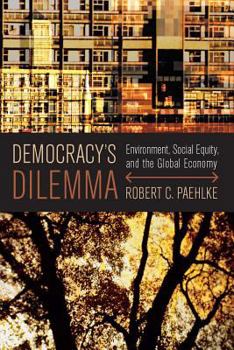Democracy's Dilemma: Environment, Social Equity, and the Global Economy
Select Format
Select Condition 
Book Overview
A call for a balancing of economic, environmental, and social concerns in the age of global economic integration.
The realities of global economic integration are far more complex than many of its supporters or detractors acknowledge. One consequence of simplistic thinking about globalization, claims Robert Paehlke, is that we tend to focus on economic prosperity to the neglect of such other important considerations as environmental and social well-being. A first step toward righting this imbalance is the recognition that economic gains do not guarantee better lives or better communities and societies. Democratic societies face a dilemma. Global economic integration produces a need for global political integration. Without it, national, state, and local governments are under pressure to forego environmental protection and social programs in order to be competitive. At the same time, global governance presents problems because of its scale and its inaccessibility to citizens. This book describes the consequences of this dilemma--such as political cynicism and lack of democratic participation--and proposes ways of dealing with it. Paehlke seeks a middle ground between those who reject globalization and those who claim that it will create the best of all possible worlds. Because there is no returning to a world that is less economically, culturally, and politically integrated, he argues, we should make every effort to advance global cooperation and equity. He suggests specific interventions that could be built into international trade agreements, including global minimum wages and provisos that natural commodities from developing economies such as energy and forest cuttings not be allowed to decline in price relative to the manufactured goods of more advanced economies. He also suggests ways to improve domestic democratic effectiveness.





